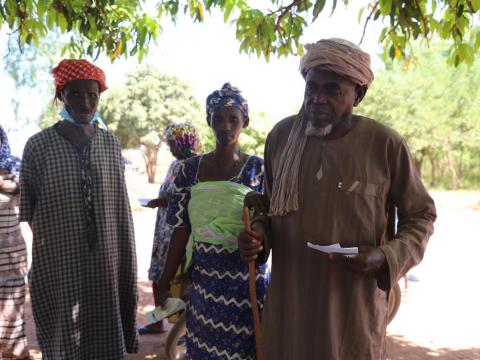Leveraging technology to ease the burden of families displaced by conflict

In emergency contexts like Mali affected by long-term conflict, the delivery of aid to vulnerable people fleeing insecurity is essential. In the midst of all the challenges and a complex environment, humanitarian organisations like World Vision ensure that humanitarian relief reaches the right people.
Last Mile Mobile Solutions (LMMS) is a technology solution designed to strengthen efficiency, effectiveness and accountability in humanitarian service delivery. Developed by World Vision in 2008, in collaboration with Information Technology (IT) industry partners, LMMS improves remote data collection, helps better management of aid recipients, enables faster and fairer aid distributions and delivers rapid reporting functionality to aid workers.
Forced to flee conflict in the central region of Mali, Ousmane Tall, an 82-year-old blind man and father to 13 children, can easily attest to that. In the past, Ousmane was a farmer, herder, and the head of a large wealthy family. Despite the loss of his sight, he continued to enjoy the gains from his hard work. Back home, old Ousmane was married to three women. Now only one remains, as the others passed away a few years ago before the crisis.
"I was not born blind. Seven years ago I lost my sight due to an eye strain for which the doctors have not found a cure, in spite going through several treatments”, narrates Ousmane.
A resident of Bankass in the Mopti region of the country, Ousmane left everything behind to flee with his family to Bamako. The continued violence and brutality in the Bankass district did not allow him to live there. He explains: “When we arrived in Bamako, we first stayed at an internally displaced persons site for a few days, but as soon as I learned that several of my relatives were in the current site, I tried to join them because for me adaptation is easier with the people with whom I’ve lived with in the past''.
“Upon my arrival to Senou site, I was fortunate to be among those that the World Vision team registered to receive food”, Ousmane continues. “During the registration process, I was given a beneficiary card and I was told that no one could get food in my place. Before receiving food, I used to go out to beg for food in the streets of Bamako to feed my family. Sometimes I would come home empty-handed. It was difficult for me to know that my children were going to starve all day.”
Ousmane’s burden was eased significantly when the World Vision emergency response rolled out food distribution activities to support families displaced due to conflict.
“I was overjoyed when I heard of the arrival of food!”, he shares. “I did not think we would be served that quickly, because everybody was in the same situation. People like me were served first at the food distribution site. For the first time, I felt considered and respected. My wife asked me to give my [LMMS] card to them [during a registration exercise] to receive a two months food voucher. It was the happiest day of my life since I left Bankass. I received 100 kilograms of rice, two large begs of milk powder, a pack of pasta, and two bottles of cooking oil. In a later distribution, I received four blankets for my family.”

After the first distribution, Ousmane understood the importance of being, registering, and benefiting from an LMMS card. He says: “Because of my handicap, I presented myself with my wife as a witness to be able to take my donation. This is truly an efficient system. I understood that it is difficult to use another person's card to get a food ration or other kind of aid unless a witness or a member of the community confirms your identity. My wife keeps my card in a safe in place for me.”
Ousmane’s is among 260 families internally displaced due to conflict in the central region of Mali, that have benefited from two months of food assistance. “Here I am safe - and thanks to World Vision, I have three meals per day”.
Unfortunately, given the large size of Ousmane’s family, they will soon run out of food. Being conscious of that, Ousmane sent his older children to work outside the site and he continued to beg to be able to put food on the table every day. “I appeal to all generous people to support us because we are in this situation against our will. My dearest wish is for the conflict to end, so I can return home because that is where I want to live out my last days”, concludes Ousmane holding his stick firmly to stand up.